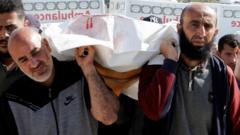As hostages released from Gaza return home, Israeli medical experts are innovating care protocols to aid their reintegration into society. Their work emerges from the challenges presented by diverse age groups and limited previous models.
New Approaches to Hostage Recovery in Israel: A Medical Perspective

New Approaches to Hostage Recovery in Israel: A Medical Perspective
Israeli health professionals develop unique protocols to assist hostages returning from captivity following the recent conflict.
In recent months, a spotlight has been cast on Israel's emerging medical discipline focused on the reintegration of hostages released from Gaza. A testament to this is the case of a woman who, after enduring over 15 months in captivity, proudly declined medical tests upon her release at Beilinson Hospital in Tel Aviv. This act was seen as a pivotal moment, signaling her reclaiming autonomy after a long ordeal.
Healthcare professionals, driving this new initiative, are pooling insights from both medical and social welfare sectors to enhance the process by which former captives transition to their lives post-captivity. As chronicled by Prof. Noa Eliakim-Raz, head of the hostage recovery department at the hospital, reactions to this progress have led them to adjust their medical schedules to prioritize emotional healing—a notable sign of improvement.
With the unprecedented nature of recent hostage situations, especially following the Hamas-led attacks on October 7, 2023, Israeli officials highlight the challenge of developing effective recovery strategies. Approximately 250 individuals were taken during the attacks, with varying ages and backgrounds, necessitating a tailored approach to recovery. According to Eti Kisos, deputy director at the Ministry of Welfare and Social Affairs, this effort is carving out new guidelines and frameworks for assisting these individuals, creating a new paradigm for mental health and social rehabilitation after captivity.
The grim backdrop of the recent conflict complicates these reconstruction efforts, but the resilience exhibited by the returning hostages and the innovative strategies of medical teams pave the way for a more compassionate reintegration process.
Healthcare professionals, driving this new initiative, are pooling insights from both medical and social welfare sectors to enhance the process by which former captives transition to their lives post-captivity. As chronicled by Prof. Noa Eliakim-Raz, head of the hostage recovery department at the hospital, reactions to this progress have led them to adjust their medical schedules to prioritize emotional healing—a notable sign of improvement.
With the unprecedented nature of recent hostage situations, especially following the Hamas-led attacks on October 7, 2023, Israeli officials highlight the challenge of developing effective recovery strategies. Approximately 250 individuals were taken during the attacks, with varying ages and backgrounds, necessitating a tailored approach to recovery. According to Eti Kisos, deputy director at the Ministry of Welfare and Social Affairs, this effort is carving out new guidelines and frameworks for assisting these individuals, creating a new paradigm for mental health and social rehabilitation after captivity.
The grim backdrop of the recent conflict complicates these reconstruction efforts, but the resilience exhibited by the returning hostages and the innovative strategies of medical teams pave the way for a more compassionate reintegration process.


















